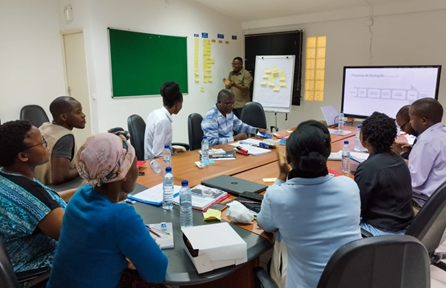Promoting a ‘Training of Trainers' approach in the energy sector in Mozambique: lessons learned
By
Esra NURJA and Evert WAETERLOOS, Enabel Mozambique
Mozambique
is one of the countries most vulnerable to climate change (UNHCR, 2022). In
recent years, the country suffered from more frequent and intense extreme
weather events such as cyclones, tropical storms and floods. It is
against this background that Enabel supports Mozambique in the promotion of
sustainable access to renewable energy. As part of this support, Enabel
responded to the lack of information dissemination within the different
government institutions at central and provincial level, by promoting a
Training of Trainer (ToT) methodology within the Ministry of Mineral Resources
and Energy (MIREME) and the Energy Regulatory Authority (ARENE). A ToT approach
is effective in transferring both technical knowledge and pedagogical
competencies to the trainers and trainees. This has the advantage of creating a
"cascade effect" of new trainers forming other trainers. An Enabel
Junior Expert was assigned to the elaboration and roll-out of such a ToT
approach. The priority topics identified to introduce this methodology within
MIREME and ARENE were: gender mainstreaming in the promotion of sustainable
access to energy, energy data collection and management, and renewable energy
technologies.
The
ToT around gender mainstreaming has been developed and fully implemented. In
other words, a ToT manual has been created and 23 Gender Focal Points (GFPs)
from different government institutions at central and provincial level, were
trained as gender trainers. Three training sessions were organised in 2022; one
within the National Institute of Irrigation (INIR), one within the Department
of Planification and Cooperation of MIREME, and one in the province of Gaza,
within the Provincial Infrastructure Service (SPI).
The
two other ToTs, around energy data collection and management and renewable
energy technologies, were developed but could not be implemented. This means
that the training manuals are largely finalised, but have yet to be approved,
so no training sessions could be held. This is mainly due to institutional and
time constraints, such as difficulties in receiving official data and feedback.
This
project has brought many lessons learned that can be resumed as follows: first,
defining a proper baseline for each target group of trainees is important to
better assess their current level of knowledge, and respond more effectively to
it. Having mixed target groups is also important to ensure that information
reaches end-users more directly. For example, in the case of the ToT around
gender mainstreaming, not only training GFPs, but also community leaders may
result in a wider and more direct outreach. Secondly, creating a working group
is important to facilitate ownership and receive frequent input from the
partner institutions. This working group can also help avoid institutional
constraints if needed. Therefore, it is important to choose the right people,
able to provide frequent and relevant information, and access to relevant
contacts. Finally, fostering all kinds of collaboration between different
institutions, Enabel projects, national and international junior experts,
allows for broader and deeper results, as this stimulates a wider sharing of
knowledge and good practices. In this project, two government institutions,
part of another Enabel's intervention in Mozambique (RERD2), have benefited
from this ToT project by participating in the training sessions, as well as
developing and implementing their own training action plan within their
institutions, under the supervision of the Enabel Junior Expert. It must be
noted, though, that this kind of project can only be successful if sufficient
financial and operational resources are allocated.
These
lessons learned can be used for the improvement of future ToTs, which are
foreseen in the new 5-year cooperation portfolio of Belgium with Mozambique.
The full capitalisation report can be accessed here:
https://www.enabel.be/app/uploads/2023/05/Capitalisation-report-on-training-of-trainers-approach-in-the-renewable-energy-sector-in-Mozambique.pdf
Picture 1. Armindo Culeco (INIR) giving a training session to his
colleagues of INIR, November 2022. Photo credits: Esra Nurja (Junior Expert at
Enabel)
Latest news from this project
No news

